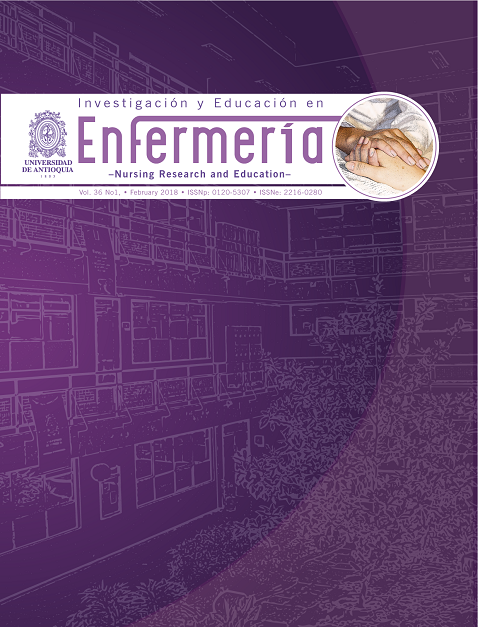Dehumanization during Delivery: Meanings and Experiences of Women Cared for in the Medellín Public Network
DOI:
https://doi.org/10.17533/udea.iee.v36n1e03Keywords:
Dehumanization, humanizing delivery, parturition, health personnel, women, qualitative research.Abstract
Objective. This work sought to describe the meanings constructed in the experiences of women in relation to the care received by the healthcare staff at the moment of delivery.
Methods. Qualitative study using the procedures proposed by the Grounded theory for data analysis. The sample comprised 18 women over 14 years of age, between 40 days and 6 months postpartum. Twelve of the participants were selected through convenience and to reach saturation of the categories, six more participants were included by using theoretical sampling. Semi-structured interviews were conducted in three information collection phases, and said interviews were analyzed line by line by using coding and categorization techniques.
Results. The mothers described the parturition experience negatively, perceiving it as the implicit imposition of stoicism to repress their emotions, pain, and discomfort and prefer an attitude of submission to the health staff. The participating mothers critically conjure up the care received, which translates into procedures performed and verbal and psychological abuse.
Conclusion. The mothers assign meanings to their experiences of the delivery process not so much as a transcendent human experience, but rather as a super-experience to the dehumanization of giving birth within the biomedical context.
How to cite this article: Mejía CM, Faneyra L, Molina DP, Arango JD. Dehumanization during Delivery: Meanings and Experiences of Women Cared for in the Medellín Public Network. Invest. Educ. Enferm. 2018; 36(1):e03.
Downloads
References
(1) García D, Díaz Z, Acosta Álamo M. El nacimiento en Cuba: análisis de la experiencia del parto medicalizado desde una perspectiva antropológica. Rev. Cubana Salud Pública. 2013; 39(4):718-32.
(2) Quevedo P. Violencia Obstétrica: una manifestación oculta de la Desigualdad de Género [Internet]. Mendoza: Universidad Nacional de Cuyo; 2012 [Cited 2017 Feb 22]. Available from: http://bdigital.uncu.edu.ar/objetos_digitales/4785/tesisquevedo.pdf
(3) Valdez SR, Hidalgo E, Mojarro M, Arenas LM. Nueva evidencia a un viejo problema: el abuso de las mujeres en las salas de parto. Rev. CONAMED. 2013; 18:14–20.
(4) Valenzuela S. Violencia ginecológica. El Espectador. 2013 Aug. 13 [Internet]. [Cited 2016 June 22]. Available from: https://www.elespectador.com/noticias/judicial/violencia-ginecologica-articulo-439930
(5) Carrillo Pineda M, Leyva-Moral JM, Medina Moya JL. El análisis de los datos cualitativos: un proceso complejo. Index Enferm. 2011; 20(1-2): 96-100.
(6) Argonáutica. FILOSOFÍA II - El difícil siglo IV a.C.: la transición hacia la época helenística [Internet]. [Cited 2017 Feb 22]. Available from: http://argonautica-fingoi.blogspot.com.co/2010/11/filosofia-ii-el-dificil-siglo-iv-ac.html
(7) Ferrater-Mora J. Diccionario de Filosofía Tomo II L-Z. Buenos Aires: Editorial Sudamericana; 1941.
(8) Luque MA, Oliver MI. Diferencias culturales en la percepción y vivencia del parto: El caso de las mujeres inmigradas. Index Enferm. 2004; 48-49:9-13.
(9) Blázquez-Rodríguez M. Aproximación a la antropología de la reproducción. AIBR Rev. Antropol. Iberoam. 2005; (42):1–25.
(10) Bourdieu P. Intelectuales, Política y Poder. Buenos Aires: Eudeba; 2000.
(11) Monroy SA. El continuo ginecobs-tétrico: experiencias de violencia vividas por mujeres gestantes en servicios de salud en Bogotá [Internet] Bogotá: Universidad Nacional de Colombia; 2012 [Cited 2017 Mar 12]. Available from: http://www.bdigital.unal.edu.co/7805/1/soniaandreamonroymu%C3%B1oz.2012.pdf
(12) Terán P, Castellanos C, González M, Ramos D. Violencia obstétrica: percepción de las usuarias. Rev. Obs. Ginecol. Venez. 2013; 73(3):171–80.
(13) Dornfeld D, Rubim EN. The health team and the safety of the mother-baby binomial during labor and birth. Invest. Educ. Enferm. 2015; 33(1):44–52.
(14) González R. Protocolo estandarizado para la atención de enfermería a la mujer que ha tenido un parto normal. Invest. Educ. Enferm; 1994; 12(2):71–7.
(15) Orueta R, Santos C, González E, Fagundo EM, Alejandre G, Carmona de la Morena J, et al. Medicalización de la vida. Rev. Clin. Med. Fam. 2011; 4(2): 150–61.
(16) España. Ministerio de Sanidad y Política Social. Guía de Práctica Clínica sobre la Atención al Parto Normal [Internet] Madrid: Servicio Central de Publicaciones del Gobierno Vasco; 2010 [Cited 2015 Dec 29]. P:50-8. Available from: http://www.guiasalud.es/GPC/GPC_472_Parto_ Normal_Osteba_compl.pdf.
(17) Odent M. La Vida Fetal, el Nacimiento y el Futuro de la Humanidad. Madrid: OB STARE; 2009.
(18) Burgo C. Los derechos de la embarazada [Internet]. Buenos Aires: Parto y Nacimiento Humanizados; 2013 [Cited 2016 Mar 19]. Available from: http://www.partohumanizado.com.ar/parto_respetado/derechos.html.
(19) De León E, Odent M. ´El parto es amor y no admite instrumental ni medicinas´. La Provincia. Diario de Las Palmas. (2013 nov 08) [Internet]. [Cited 2017 Apr 02]. Available from: http://www.laprovincia.es/sociedad/2013/11/08/michel-odent-parto-amor-admite/569806.html
(20) Serrano J, Morin E. Ciencia con consciencia [Internet]. [Cited 2017 Feb 28]. Available from: http://biblioteca.itam.mx/estudios/estudio/estudio06/sec_47.html.
(21) Machado MA. ¿Cómo parimos?: de la violencia obstétrica al parto humanizado [Internet] Montevideo: Universidad de la República; 2014 [Cited 2017 Sept 02]. Available from: https://www.colibri.udelar.edu.uy/bitstream/123456789/5318/1/MACHADO.pdf
Downloads
Published
How to Cite
Issue
Section
License
Derechos de propiedad / Direitos de Propriedade
English: If the article is accepted for publication, all copyright will be of exclusive property of Investigación y Educación en Enfermería. The text and the graphics included in the publication are exclusive responsibility of the authors and not necessarily reflect the thought of the Editorial Committee.
Español: Si el artículo es aprobado para publicación, todos los derechos son de propiedad de Investigación y Educación en Enfermería. El texto y las gráficas incluidas en la publicación son de exclusiva responsabilidad de los autores y no necesariamente refleja el pensamiento del Comité Editorial.
Português: Se o artigo for aceito para publicação, todos os direitos autorais serão de propriedade exclusiva de Investigación y Educación en Enfermería. O texto e os gráficos incluídos na publicação são de responsabilidade exclusiva dos autores e não refletem necessariamente o pensamento do Comitê Editorial.















